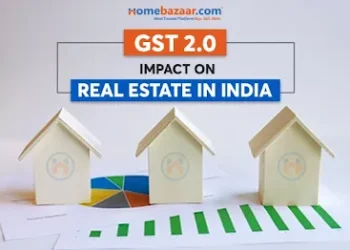Homeownership is the biggest aspiration and a sense of pride. However, the homebuying journey does not end after booking the property.
The validation of property ownership solely depends on the successful registration of the property with the government. Property Registration makes you a lawful owner of the subject property.
Under Section 17 of the Indian Registration Act, 1908, you must register your property at the office of the Sub-Registrar of Assurances within the jurisdiction of the property location.
The property registration process aims toward a legitimate transfer of ownership from the seller to homebuyers. Property Registration is an assurance regarding the genuineness of the deed.
It prevents you from any fraud and helps to maintain the records of property. The property registration process is crucial, and it is imperative for homebuyers to be ready with all necessary documents required for registration.
Following is the detailed and simplified purview of the entire process.
Page Contents
Property Registration Details

Accurate documentation is pivotal for initiating the registration process. It is better to consult a legal expert for an understanding of the entire process and required documents.
All necessary documents, such as the Agreement of Sale, Sale Deed, Identity Proofs and Photographs of Authorised Signatories (Seller and Buyer) and 2 Witnesses, PAN Cards, Encumbrance Certificate, payment proof of stamp duty, and registration fees, should be arranged beforehand.
The Sale Deed will only be executed post-verification of these documents.
Property Registration Process

The property Registration Process seems to be complex. However, it is very easy if you have a thorough understanding of the process.
One should determine the circle rate of their respective jurisdiction, as the stamp duty is generated considering the circle rate of the property.
The following are the steps of the property registration process:
-
Documents Arrangement
Documents act as the source of property authentication. Both parties should have all necessary documents ready before visiting the sub-registrar’s office.
Original and photocopies of the Agreement of Sale, Encumbrance Certificate, and Sale Deed are the must documents.
Both parties should ensure that details of the property are accurately mentioned in the agreement of the sale and sale deed.
-
Sale Deed and Stamp Duty Payment
You should compare the circle rate and market value of the property. The stamp duty will be calculated over the highest value.
The sale deed must be transcribed over the non-judicial stamp paper. Stamp paper can be obtained electronically or from authorized stamp vendors.
The sale deed should comprise the details of the property and both parties.
It should be drafted based on the transaction type. It can be a gift deed, sale deed, or lease deed.
You have to pay the stamp duty before registering the sale deed. The stamp duty rate varies from state to state, depending on several factors.
-
Identity Verification of Authorized Signatories
The seller and buyer are the authorized signatories in the property registration process.
They should carry with them the original and photocopy of their Aadhar Card, PAN Card, and Voter ID.
The concerned person in the office obtains the photographs, signature, and thumb impression of the signatories.
-
Presence of Two Witnesses
Both parties should take two witnesses with them. The presence of witnesses is important while executing the sale deed.
In case of any future discrepancies, witnesses act as supporting evidence.
Similar to the authorized signatories, witnesses must carry their identity proofs and give their photographs, signatures, and thumb impressions.
-
Proof of Stamp Duty and Registration Charges Payment
You must pay the registration fee before registering the documents at the Sub-Registrar Office.
You must submit the challan or proof of stamp duty and registration fees. Post-verification of the proof, the sale deed will be executed.
-
Execution of the Deed
Post-verification of the documents and identification, the concerned person takes the signatures and thumb impressions of the authorized signatories for registration of the deed.
You will receive the receipt of registration once your sale deed is registered. You can get the certified copy of the sale deed within 2 to 7 days from the date.
You can check for discrepancies, if any, and rectify the same. You should also obtain the Encumbrance Certificate.
Online Property Registration

You must first check if an online registration service is available in your State. If available, you can only do the part-process of the property registration.
You must visit the government website for registration and fill in your details and property details.
Confirm the stamp duty and make the stamp duty and registration fee payment. You should obtain the e-receipt of both the payment.
If your property exceeds the value of ₹ 50 Lakhs, then you have to pay the required TDS of 1%.
After the payment, you have to visit the Sub-Registrar’s office for submission and verification of documents. Both the authorized signatories and two witnesses must be present to execute the sale deed.
Property Registration Without Seller

Both buyer and seller must be present to execute the deed. However, in the absence of the seller, the process is done by his representative on his behalf.
The representative gets the Power of Attorney. The seller has to draft the POA document, mentioning property details, the extent of authority given to the representative, and the tenure of the given authority.
The POA document has to be notarized. The required stamp duty of 0.25% should be paid for the POA document.
Post-verification of the POA document and the representative’s identification, he can conduct the process on behalf of the seller.
Property Registration Charges Calculation

The property registration charges comprehensively include stamp duty, registration fee, documentation, and cess charges if applicable. These charges vary from state to state.
The stamp duty ranges between 3% to 7% and the registration fee is based on 1% of the total value only if the property is valued below ₹ 30 Lakhs.
If the property value exceeds ₹ 30 Lakhs, then the registration fee will be ₹ 30,000 maximum.
Stamp Duty Calculator
- For stamp duty calculation, you can visit the IGR website of the state government.
- Click on the stamp duty calculator under the Stamps section. Then select the type of deed.
- You have to select the jurisdiction if your property comes under the jurisdiction of the Municipal Corporation, Municipal Council, or Gram Panchayat.
- Then you need to add the consideration value and market value of the property. After submitting, you will get the exact amount to be paid for the stamp duty.
The property registration charges depend on the following factors:
- Location: The location of the property determines the charges. If the property is located in an upscale area, the stamp duty and cess charges will be higher and vice versa.
- Property Age: If the property is old construction, then there will be a deduction in the total charges. Whereas, new property will cost you more.
- Gender: Women receive a concession on stamp duty if they are property owners.
- Amenities: The number of amenities determines the extent of stamp duty. If there are numerous deluxe amenities, the total registration charges will be higher.
- Purpose: The property registration charges for a commercial property are much higher than those for a residential property.
Property Registration Charges in Mumbai
The stamp duty varies for properties in Mumbai, depending on the jurisdiction under which the property is located. The stamp duty for properties coming under the municipal corporation is 6% of the market value.
It is 4% for properties under the municipal council or cantonment of any area within MMRDA and 3% for properties under Gram Panchayat. The registration fee remains the same at 1%.
Property Registration Charges in Bangalore
The Karnataka government reduced the stamp duty for properties ranging between 21 lakhs to 45 lakhs from 5% to 3% a few months back.
The stamp duty for properties valued above 45 Lakhs is 5% and for those valued below 20 Lakhs is 2%. The registration fee stands at 1% of the total property value.
Learn More: Latest Stamp Duty and Registration Charges In Bangalore
Property Registration Charges in Chennai
The property registration charges in Chennai are higher than the other states in India. Contrary to the general registration fee, in Chennai, the registration fee stands at 4% of the property value. The stamp duty in Chennai is 7% of the market value.
FAQs
| What if the property is not registered with the Government?
Property Registration is mandatory to register your property in the records of the government. If you fail to register, there will be no legitimate evidence of your ownership over the property. You can claim compensation if your property is acquired by the government or anyone else. |
| What is the governing Act for the Property Registration?
Property Registration is governed under the Indian Registration Act 1908, and it is mandatory to register property under Section 17. |
| How can I execute the sale deed if the seller is absent?
In such a case, the seller has to assign a representative on his behalf. The power of Attorney document needs to be drafted, and notarized, and the required stamp duty should be paid for it. The person can execute the deed post-verification of the POA document. |
| Can I register the property online?
You can only do the half process electronically. You can submit your details and make the payment of stamp duty and registration fees only. After obtaining the receipt or challan of the payment, you have to submit all necessary documents along with it at the Sub-Registrar office of your jurisdiction for signing the deed. |
| Are there concessions for women property owners in the stamp duty payment?
Some states provide concessions on stamp duty for women whereas many do not. In Maharashtra, if the stamp duty for men is 6% then it is 5% for women in urban areas. |








